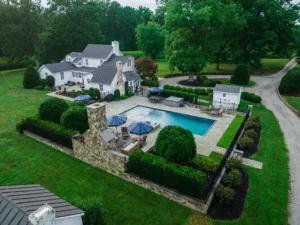Hey Beautiful!
We see you are researching different venues for your big day. Stressed out yet?! GIRL, we know it can be overwhelming. One of our team members recently got engaged a few months ago and has been on the hunt for the perfect place to tie the knot. After 3 months and 8 different venues, they finally found their perfect place! Each time they arrived at a different venue, they would always provide them with a welcome packet filled with information on pricing, preferred vendors, and most importantly- What’s included once you sign the contracts. Sometimes, venues will say they provide you with a “Day of Venue Coordinator”. Our question to you is: Do you really know what that means?
First off, it’s NOT a replacement for a wedding planner. Trust us! You’re going to need both. To make things a little easier, We’ve outlined the differences between a venue coordinator and an event coordinator/planner below:
Venue Coordinator:
-
- Location-Focused: A venue coordinator works for the specific venue where the event is taking place. They are employed by the venue and primarily focus on managing the aspects related to that specific location.
- Venue Logistics: Their responsibilities typically revolve around the venue itself, including setup, layout, and ensuring the facilities are in good order. They may help with things like tables, chairs, lighting, and audio equipment provided by the venue.
- Vendor Coordination: Venue coordinators often liaise with in-house catering and sometimes coordinate with the venue’s preferred vendors. However, they typically don’t handle external vendor management or logistics.
- Timeline: They may ensure that events within the venue run on time according to the venue’s schedule, but they generally don’t manage the overall event schedule.
- Limited Scope: Their role is limited to the venue’s facilities and services. They usually do not handle tasks like creating detailed event timelines, managing vendors, or overseeing the entire event from start to finish.
- Event Coordinator and planner:
-
- Comprehensive Event Management: An event coordinator, on the other hand, takes a more comprehensive approach. They focus on the entire event and manage all aspects of it, not just the venue. They may or may not be affiliated with a specific venue.
- Vendor Management: Event coordinators handle the hiring and management of all vendors, including caterers, florists, photographers, musicians, and any other professionals involved in the event.
- Detailed Planning: They are responsible for creating and executing a detailed event plan, which includes timelines, schedules, and logistics for the entire day. This encompasses not only the venue but also any off-site locations if needed.
- Problem Solving: Event coordinators often deal with unexpected challenges and problem-solving during the event, ensuring that everything runs smoothly and according to plan.
- Client-Centric: They work closely with the couple or client to understand their vision and preferences, and they tailor the event to meet these expectations.
- Flexible and Versatile: Event coordinators are more versatile and can adapt to various venues and situations. They are not tied to a specific location.
- In summary, the main difference lies in the scope and focus of their responsibilities. A venue coordinator specializes in managing the venue’s facilities and services, while an event coordinator takes on a broader role, overseeing the entire event, from planning and vendor management to on-the-day execution. Wedding planners often work in the capacity of event coordinators, ensuring that all elements of the wedding come together seamlessly, including the coordination of the venue

Check out Historic Whitewood to see where Amanda is getting married next year in Powhatan, Virginia






